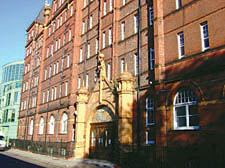|
|
 |
| |
 Arlington House homeless hostel as it looks today Arlington House homeless hostel as it looks today |
Orwell hostel vulnerable to developers
Safeguarding covenant may be lost in rushed deal after owning charity’s financial failures
DISASTROUS financial mismanagement by the charity running homeless hostel Arlington House has led to fears that the former refuge of Orwell and Behan is vulnerable to private developers for the first time in its 104-year history.
With an apology and a pricetag for ongoing renovation estimated at £8million, the Grade II-listed hostel in Arlington Road, Camden Town, was literally given away – sold at “nil cost” – by the charity Novas Scarman Group (NSG) last week.
It passed to housing association One Housing Group, which pledged to maintain it as a hostel.
But the transfer terms – an 11th-hour deal rushed through by councillors on June 4 – included a clause allowing a mortgage company in future to sell Arlington House on the open market. This could be activated in the event of the current or any future owner defaulting on mortgage payments and effectively ends its covenanted protection for exclusive use as social housing.
Harriet Garland, the former Camden mayor who campaigned for the building to be taken into socially responsible ownership in the 1980s, said an open market sell-off would be a “tragedy”.
“You would never be able to replace it,” she said. “Homelessness is on the rise and socialist principles are being trampled on. Why should homeless people have to bear the brunt of it?”
When Camden Council sold the hostel to the then Novas Overtures group in 1991 for £1.73m it included a covenant that the building must be used to provide “social housing at affordable rents for single homeless people”.
Under the terms of the new deal, if One Housing defaulted on the £8m renovation and no other homeless organisation stepped forward, the hostel could be sold.
It was already undergoing rapid change from the traditional model when Novas hit trouble.
Bed numbers have been cut from 400 to 95 to make way for an art gallery, coffee shop, restaurant and market stalls. Thirty-five “low-rent” flats will also be available when One Housing complete the renovation, scheduled for January 2010.
Novas, a national provider of social care, admitted its “failure to manage elements of the finances” after investing heavily in a string of failed art galleries and commercial enterprises.
How the award-winning charity ended up in this situation remains the subject of a nine-month Housing Corporation inquiry launched last October.
Despite selling off their entire property portfolio, including a fashion shop in Chalk Farm, premises in Parkway and a £260,000 Chinese theatre in Liverpool, Novas said it had been “hit by the fall in property prices” and forced to transfer Arlington House.
A council spokesman would confirm only that the Town Hall was “at the forefront of negotiations” to ensure Arlington House became the flagship hostel envisaged by a government-funded £22m refurbishment project.
In October, a spokeswoman said: “NSG has a robust balance sheet, with assets of over £40m with no loans against these.” But by last week, it was forced to admit: “We should not have got into the difficulties we did and we apologise unreservedly for this failure to manage elements of the finances. We have now largely addressed these issues.”
Director Matthew Pike and the entire NSG board have been replaced in recent months. A Novas spokeswoman said the management structure had been “too complex”.
Down and out? Story of Arlington House, a lifeline for the poor
ARLINGTON House, as it is now known, was originally built as the last and largest of the Rowton Houses in 1905.
These large, institutional buildings for the poor and homeless were established by the philanthropist Lord Rowton (left), the secretary to Benjamin Disraeli who was appalled at the conditions in working men’s hostels of the day.
The Rowton Houses offered better, cleaner places to live for a nominal charge.
The success of the first hostels in Vauxhall, King’s Cross and Hammersmith provided the funds for the most ambitious project yet: the Camden Town house in Arlington Road had 1,103 beds, plus a cavernous dining room and a library.
Arlington’s residents were mainly Irish labourers. The writers Brendan Behan and Patrick Kavanagh were both guests, and George Orwell described his stay in a “splendid” Rowton building in Down and Out in Paris and London.
The Rowton company held the Arlington Road building until they gave up the hostel business in 1982.
The hostel was brought into socially responsible ownership under Camden Council in 1983 and redesigned to accommodate 400 residents in 1985.
In 1993, Arlington House changed hands again – to the social justice charity Novas. Renovation work began in 2007. |
 |
|
|
 |
Your comments:
THE claim that it was brought into "socially responsible" ownership when it was taken over by a state agency is offensive. Was not Lord Rowton (the wealthy secretary of a Conservative Prime Minister) motivated by social responsibility? Socialists can claim no monopoly on social responsibility, in fact I would argue that for the last half century they have specialised in social irresponsibility, by destroying the fabric of working class family life, and undermining the work ethic of the working class. The old respectable working class, to which my Camden Town grandparents belonged, had the rug of respectability pulled out from under them by feckless middle class lefties with no appreciation of what the consequences of what they were doing would be for poor. My family got out and became middle class by sticking the to the old codes of respectability and self-reliance, which were so valued by the best of the working class. Many didn't, and are now living the socialist nightmare of drugs and knives on failed socialist housing projects.
O. Chettle
|
| |
|
 |
|